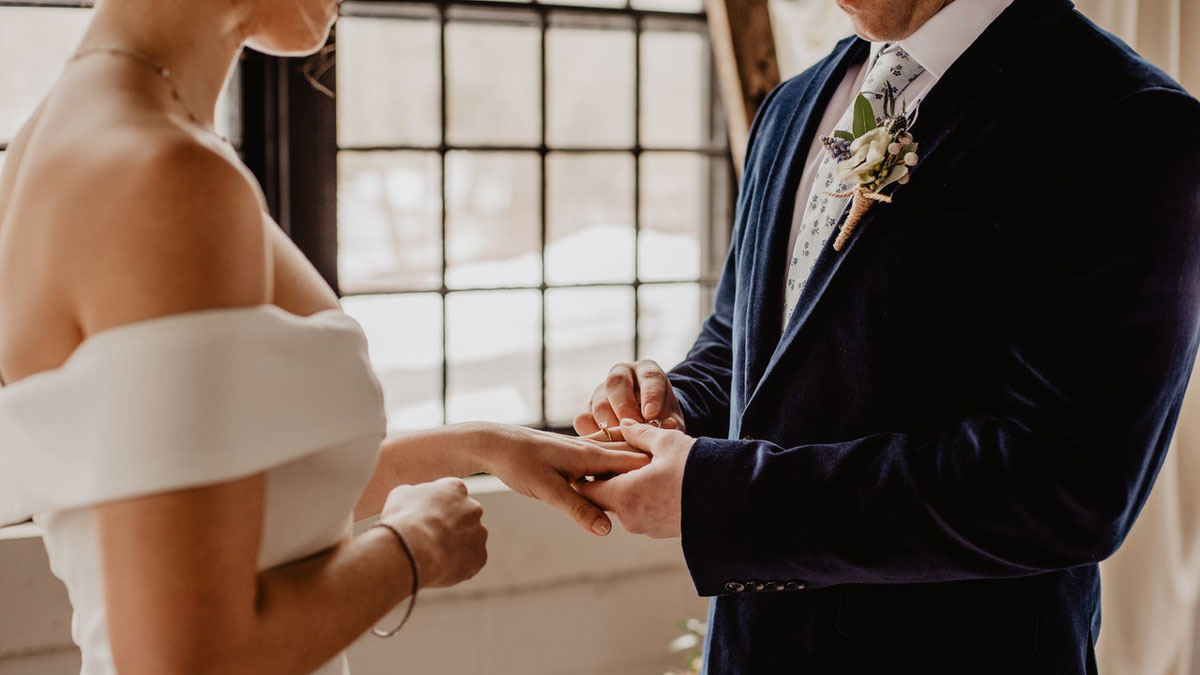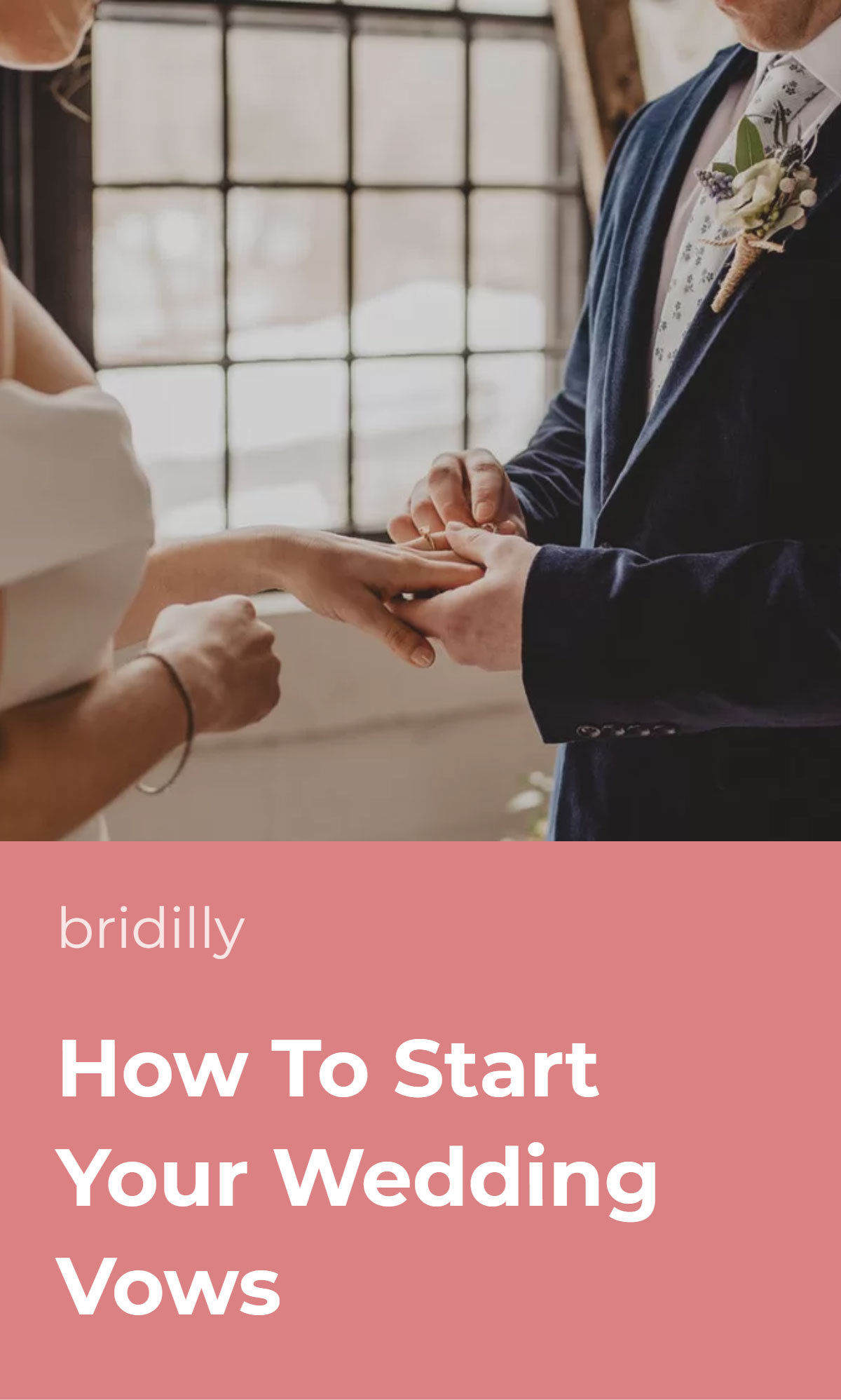Embedding your love in words isn’t simple. Struggling with how to start wedding vows is normal, even for pro writers.
Writing a vow is a tremendous undertaking, and the beginning is usually the most challenging part.
Some people can’t find worthy words to express their admiration; others have a general fear of writing.
Frankly, each relationship is unique, so there’s no universal wedding vow starter that would suit everyone.
Still, most wedding vows have a similar structure that serves as an excellent reference point. Ask yourself the right questions, gather memories, draw inspiration, and you’ll manage to write a beautiful vow.
Table of Contents [show]
Consider Your Vow Style
Before you begin writing your vow, define your style. Wedding vows can be heartfelt and romantic, short and sweet, or humorous – the choice is entirely up to you.
Consider your personality, the ceremony formality, and your partner’s expectations.
Your wedding vow style should be consistent from the beginning until the end. The first lines set the tone of your speech and public expectations.
For example, a traditional religious wedding ceremony calls for a formal, romantic vow, although a couple of funny lines as icebreakers won’t hurt anyone. In contrast, a casual civil ceremony allows for unique, unconventional vows.
Communicate with your partner regarding the vow style. You don’t have to write the vows together, but aligning the tone is a good idea. However, it isn’t mandatory – some partners express their love differently, and that’s perfectly alright.
Define Who Your Partner is To You
The traditional wedding vow structure is very definite, but you don’t have to follow it.
Still, the conventional outline can help you get started with writing. Most formal wedding vows begin with the partner’s name and a statement about them.
In a formal ceremony, you may tell your partner’s full name with the last name in a formal ceremony, but a short name or even a nickname is sufficient for a casual wedding.
Think of who your partner is to you – besides being your soon-to-be spouse, of course.
Maybe they’re your best friend, a partner in crime, favorite travel pal, soulmate, inspiration, or emotional support.
Telling what your relationship means to you and what connects you apart from romantic attachment is a great way to begin your vow.
Say How You Feel at The Moment
The best way to start a wedding vow is to say how you feel standing at the end of the aisle in front of your partner. Asking thought-provoking questions can help you embed your attitude and feelings into words.
Could you imagine when you first met that you would get married? Is stepping on the next level of your relationship thrilling, elevating, joyful, or peaceful? How does your partner make you feel – safe, secure, loved, happy?
For instance, you may write something along the lines of “(partner name), you’re my best friend and my soulmate. When we met at college, I knew right away that we’re meant to be, and standing here in front of you, my heart fills with joy…”.
Note that this part isn’t mandatory. The truth is, there are no strict rules regarding how to start your vow. If you don’t yet know how you’ll feel standing at the altar or consider it too personal, feel free to leave it out.
Say What You Love About Them
Many people begin their vows by explaining what they love about their partner. That’s an excellent wedding vow starter because it revolves around your partner’s best traits rather than yourself.
Every person would like to hear what people value about them the most. Compose a list of all the major and minor things you admire in your significant other, then choose the most critical points.
Try not to say generic things – instead, be personal. Perhaps, there’s something about your partner that you admire, but they have no clue about it.
Maybe they make you a better version of yourself. Perhaps they are forgiving, honest, or generous.
Perhaps, you’re amazed by their intelligence or witty humor or thankful for supporting you when you feel down. Maybe you love them for respecting your boundaries or accepting you with your best and worst traits.
There’s no need to write down everything you love about your partner, but you also don’t have to pick just one most crucial point. Choose three to five vital lines to get your vow started.
Incorporate a Story
Many people feel that short statements like “I love you for your humor and intelligence” aren’t a worthy representation of their feelings. Some find traditional wedding vow starters generic and seek something more creative.
Either way, if you don’t want to follow the traditional structure, you may jump right to a short story. Start your vow with “(partner name), remember when we…” or “(partner name), the day you…”.
For example, instead of saying that your partner is brilliant, you may share a story showcasing their intelligence. Maybe you fell in love when your partner was helping you with a college project.
Maybe you would like to say to everyone how talented of a musician they are and can tell a story about them practicing for a concert. Perhaps, you understood how loving a heart they had when they saved a stray dog.
Remember that you don’t need to tell your entire relationship story. Keep it as short as possible because you also need to leave time for your promises. As a rule of thumb, don’t dedicate over a minute to a single story.
Examples of Funny Vow Beginnings
Vow starter examples can help you break the writing barrier. Once you write down the first lines, the process will become much easier. However, don’t copy every line of your vow from the internet – customize them to make them feel personal.
Assume you’re both sports enthusiasts; you may start the vow with “I (name), take you, (partner name) to be my wife and chief tennis doubles partner…” or “I love you as much as the Chicago Cubs.”
If you’re both animal lovers, you may begin with, “You’re the only person I love and cherish as much as I do our golden retriever, Charlie. Until death does us part, I will lint roll the sofa every time your parents visit us.”
If you’re partners in crime, you may start with, “Let’s make bad choices, eat the wrong foods, take wrong turns together, and then let’s share fun stories, the same ones, until everyone gets fed up with us.”
Some people start their humorous wedding vows by addressing the public, for instance, “We all look great today. What’s the reason we’re all dressed up for?”.
When writing a funny wedding vow, remember to keep it appropriate. Don’t mention exes, don’t say gross words, and don’t tell anything that could embarrass your partner even if you find it funny.
Remember that when it comes to wedding vows, the funniest things are harmless and lighthearted. Avoid mentioning your partner’s odd habits, such as leaving their hair in the bathtub or forgetting to change the toilet paper roll.
Don’t turn your entire vow into a stand-up. Stick with the 70/30 romantic to funny ratio. If your first line is humorous, continue with a formal statement, or begin formally and sprinkle jokes here and there.
Examples of Romantic Vow Beginnings
Romantic wedding vow starter examples are endless, but most of them have a similar structure. They begin with the partner’s name, then move on to a declaration of love, expression of current feelings, and explanation of the partner’s best traits.
For instance, you may start with “(partner name), you are my soulmate, my inspiration, my best friend, and my everything. I’m looking forward to spending a lifetime by your side. You’re a caring, honest, and talented person…”.
Alternatively, you can begin with a romantic statement, such as “(partner name), although it is until death does us part, I know that we will never truly part because our souls are made for each other.”
Other romantic vow starter examples include “From today onward, you and I will be one in heart, body, and mind,” “I never knew that life could be a dream until I met you,” and “Today you will become my wife, but we were soulmates forever.”
Examples of Formal Vow Beginnings
Some people find romantic phrases way too personal for a public vow exchange and humorous too informal for a traditional ceremony. In this case, you may exchange classic, formal vows that are always appropriate.
Perhaps, the most traditional wedding vow wording is “I, (name), take you, (partner name), to be my (spouse). I vow to be true to you in good times and in bad, in sickness and in health. I will love you and honor you all the days of my life.”
Such a vow is equally suitable for Catholic, interfaith, and civil wedding ceremonies. Another universal vow starter is “I, (name), commit myself to you, (partner name), as a (wife/husband) to learn and grow with, to explore and adventure with, to respect you…”.
Formal wedding vows typically don’t feature anything too personal. They may seem too general to some people, but it isn’t necessarily bad. Formal vows are perfectly balanced and never get awkward.













No Comments Add one
Leave a Comment